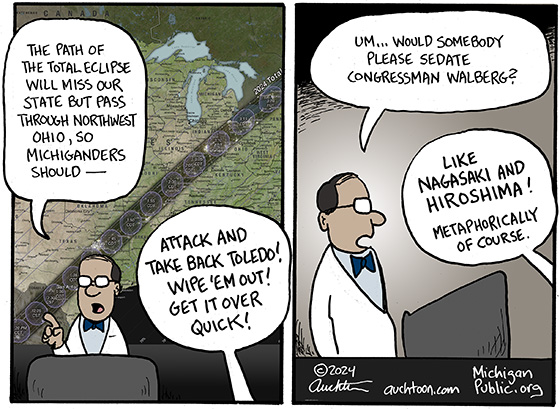Like Nagasaki and Hiroshima

With such a deep saturation of bonkers-level behavior by elected officials and the blink-and-you-missed-it news cycle, you may not be aware of Rep. Tim Walberg (R-Mich.) recently saying in a town hall that Gaza should be dealt with “like Nagasaki and Hiroshima.”
All right. Let’s be fair. Let’s explore what he said around that quote. (Spoiler: It makes it worse.)
This from the Washington Post:
Rep. Tim Walberg (R-Mich.) was answering a question from a constituent during a town hall in Dundee, Mich., on Monday, about the United States’ plan to build a floating pier off the coast of Gaza to deliver humanitarian aid.
“Why are we spending our money to build a port for them?” someone asks in the video.
Walberg, who is not seen in the video, responds by saying that the United States “shouldn’t be spending a dime on humanitarian aid” and then references the two Japanese cities where the United States dropped atomic bombs during World War II.
“It should be like Nagasaki and Hiroshima. Get it over quick,” Walberg said.
Walberg’s office responded saying he “clearly uses a metaphor to support Israel’s swift elimination of Hamas, which is the best chance to save lives long-term and the only hope at achieving a permanent peace in the region.”
Uh-huh. Metaphor. Okay. Sure. But what a terrible, tone-deaf, dangerous metaphor. And let’s not look past the whole “not a dime of humanitarian aid” bit. My God. But it gets worse. Again, from the Washington Post:
…after the congressman said “Get it over quick,” he added, “The same should be in Ukraine.”
“Defeat [Russian President Vladimir] Putin quick,” Walberg continued. “Instead [of] 80 percent in Ukraine being used for humanitarian purposes, it should be 80 to 100 percent to wipe out Russia — if that’s what we want to do.”
Walberg seems to be seriously channeling General Buck Turgidson, the George C. Scott character in Dr. Stangelove. That was political satire. It’s not so funny when it’s real.
Editor’s note: John Auchter is a freelance political cartoonist. His views are his own and do not necessarily reflect those of Michigan Public, its management, or its license holder, the University of Michigan.

